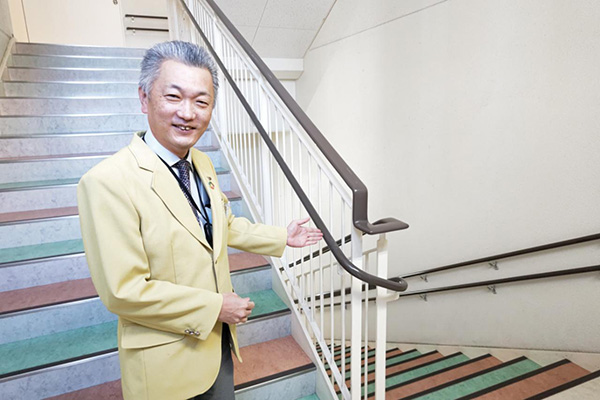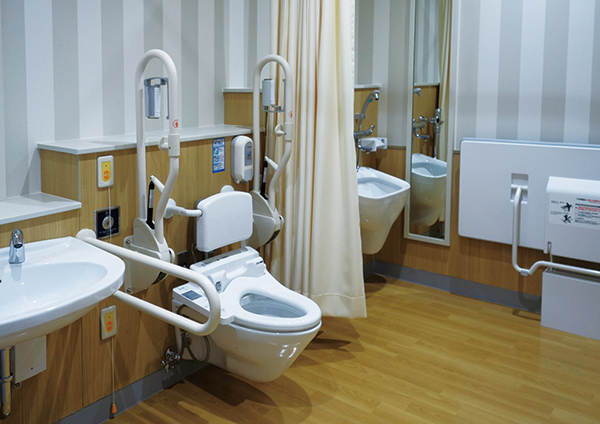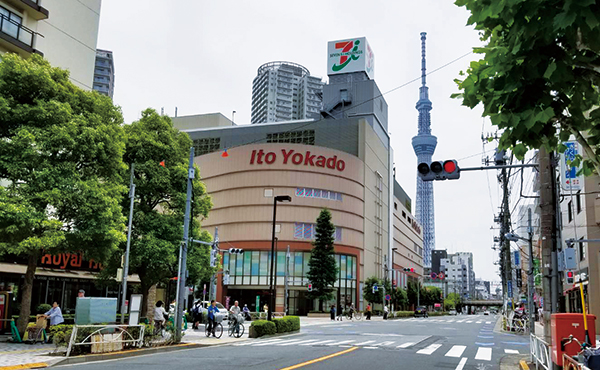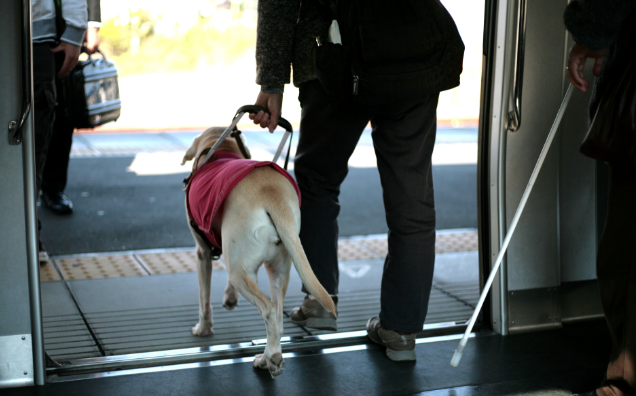- TOP >
- Efforts of Ito-Yokado's Hikifune store
Efforts of Ito-Yokado's Hikifune store 1-2-1 Kyojima, Sumida-ku, Tokyo
Creating a barrier-free store that is community-based and in keeping with the times
Barrier-free shopping experiences that achieve success in terms of both hard (tangible) and heart (intangible) factors, two sides of the same coin
Ito-Yokado's Hikifune store is a large shopping mall located near Hikifune Station (Tobu Railway). The mall reopened in 2011, in this area that was originally downtown. In line with the flow of the times-including changes in barrier-free thinking as well as the aging of the local population-the people running the mall take meticulous action in terms of both hard (tangible) and heart (intangible) factors. Hiroyuki Naruoka the store manager of the Hikifune store, talked to us about the specific efforts.

A store that is easy for all kinds of people to shop at
 A multipurpose restroom
A multipurpose restroom
At our store, we have set up an inquiry intercom for visually impaired people at the main entrance, which makes it possible for them to talk to employees at the service counter. We have also made our aisles wide so that customers in wheelchairs and electric carts can safely and easily shop with us as well, and rental wheelchairs as well as special carts, trays, shopping baskets, etc. are available in the store. The wheelchair trays and shopping baskets in particular are used by many customers.
The steps of our stairs are alternately colored, and two hand rails with their ends bent inward for safety reasons have been installed at different heights on both sides. The ends of the handrails include braille that indicates the floor numbers for visually impaired people, and braille blocks have also been set up before the bottoms and tops of the stairs. In addition, we use low-speed escalators that can be easily used by our elderly customers as well.
We have secured as much space as possible for our restrooms, and the multipurpose restrooms in particular are designed to be easy for physically disabled people, elderly people, expectant and nursing mothers, customers with infants, and similar customers to use. More specifically, we have set up voice-guidance buttons as a way to provide information on restroom equipment, service sinks for ostomates, and adjustable-temperature hand showers that can be used by such customers to wash off their clothes and abdomens. In addition, eight years ago, we surrounded our barrier-free toilets with curtains so that customers who have caregivers with them can use the toilets without worry.
On top of this, we have equipment that can be used to change baby diapers or clothes. Because our diaper-changing baby seats are collapsible, wheelchair users can easily go in and out of our restrooms as well.
Service with plenty of heart based on the perspective of local people

To help develop heart, when training new employees or opening new stores, we provide opportunities for experiential normalization learning-including the experiences of people who actually use wheelchairs, visually impaired people, and people who provide assistance-as well as learning about how to communicate with hearing-impaired people and human rights promotion training intended to teach our employees how to genuinely care about others.
In fact, there was a time when a hearing-impaired customer came to our store, and one of our staff members communicated with them using sign language instead of written communication, which made the customer extremely happy. In addition, a physically disabled special-school teacher comes to our store at about the same time every day, so we started waiting to greet them, and they happily told us that our store is "one where they can shop without worry."
At our Human Rights Promotion Center, to promote normalization activities, we conduct business that includes in-house consultations and education related to achieving barrier-free stores, the introduction of facilities to nearby customers when we open new stores, human rights promotion training, and business related to the employment of disabled people. We hope to continue pursuing various efforts based on the perspective of local people in cooperation with our stores. Hard (tangible) and heart (intangible) factors are two sides of the same coin, and we will continue to treat both as essential.
 social media accounts
social media accounts
Tokyo, a city that is accessible everywhere to anyone.
Sightseeing where you wish, as you wish.
This ability to travel anywhere you please makes life that much richer.
Tokyo welcomes your visit.
Here you can encounter tradition,
history, culture, nature, technology,
and, best of all, smiling faces.
Making tourism closer and more
enjoyable through accessible tourism.




